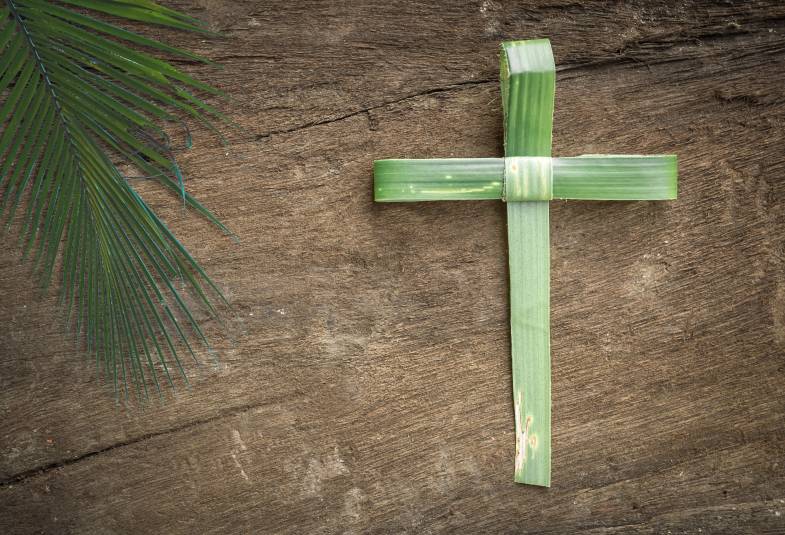A Palm Sunday reflection by Archbishop Justin Welby.

For Christians this will be a Palm Sunday unique in almost the last 800 years. Normally, we would be in our churches singing praises to Jesus the King, perhaps waving palm crosses or taking part in processions to remember Jesus’ entry into the city of Jerusalem. Some adventurous and optimistic vicars who have managed to arrange a donkey and have lots of children in church would be worrying about children sticking palms in each other’s’ eyes, or the donkey misbehaving. (Donkeys always misbehave.)
This year, we are all celebrating separately in our homes. The celebration is tinged with real sadness for the loss of contact with our physical communities and the constraints of this present time. For some, particularly in large urban areas, it will be a day of emotional clouds loaded with worry over someone who is ill, or even with grief over the death of a loved one.
Palm Sunday is a strange festival anyway. It’s a celebration of Jesus as King, but even as we celebrate, we are conscious that the next part of the story gives us some extra perspective. The crowds cheered and lauded Jesus as he entered Jerusalem; the same crowds seemed to turn on him when he was not the military conqueror they expected.
There is a bigger story going on at Palm Sunday than most people at the time could see. We have the benefit of the bible telling us the rest - we can see the journey of Jesus to the cross. But the clues were all there at the time: the King arriving into Jerusalem was on a donkey, not a war horse. As the crowd waved their palm branches and shouted “Hosanna”, many were expecting a leader who would fight their battles and liberate them from the Roman Empire. What they got was a different kind of king - infinitely more powerful, yet vastly more humble. The week took a very different turn: in just a matter of days, Jesus would be executed as a criminal, silent before his abusers, humiliated and tortured.
Lent is a good time to be asking, what is our mental or emotional picture of God? It is a time to think about what we are expecting from Him. And crises are an especially good time to be asking that question.
We might not be anticipating a warrior king, but right now we may want God to make the coronavirus disappear, to make everything go back to normal again. If we are honest with ourselves, we can want God to be like a fairy-godmother, to wave a magic wand and take away all the pain and suffering.
These are very human responses. We find them in the Psalms. They are not sinful, even if they are the wrong picture. The Psalmist in Psalm 44 gets quite personal with God. He tells God that God is a rubbish businessman – he has sold his people, and not even done a good deal. He suggests God is asleep, and tells him to wake up.
Prayer should always be honest – but it also goes far beyond just honesty. It’s a meeting with God himself, whom Jesus says we can address as father, as Lord, as healer and redeemer, life and truth, creator, and many more ways.
Palm Sunday confronts us with God being disruptively different. God the revolutionary. We see God who takes on the pain, who walks the journey of Holy Week, deeper and deeper into a darkness we cannot enter. God in Jesus lets his friends deny and betray him. God, in Jesus, suffers rejection and abuse, and the ultimate desolation of a lonely yet innocent death. All the worst of human experience is heaped on Jesus.
So, this Palm Sunday let us ask ourselves: what are we praying for? What are we expecting of God? The thing is, God is so infinitely loving and generous that he comes to meet us wherever we are at, because he knows and understands our sufferings. On that first Palm Sunday, Jesus criticised those who would seek to silence the cries of the crowd. Bring all you are – your hopes, fears, sadness, uncertainty – to Jesus. He never turns anyone away.
And because of the life and death of Jesus, we can trust in the forgiveness of God and his victory over death. But here is the challenge of Palm Sunday: in trusting in Jesus, the Servant King, we are set on a path of following his life and pattern, right to the cross, so we too might experience the glorious resurrection.
Resurrection requires that we carry a cross. And that means turning away from what is wrong and putting our selves, our self-obsession and our selfishness on the cross. Putting self on the cross leads straight to resurrection.